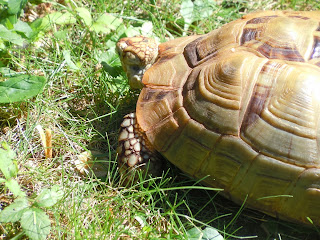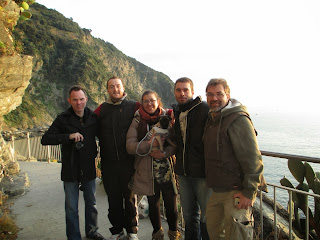She could point out things like "Got a great grade on a test", or "Friend brought me an extra cookie", or "My hair looked fantastic". I asked her what she would resort to on days when things didn't go so well, and we had a really funny time coming up with ideas, the penultimate of which was "I didn't catch malaria today." That would be reserved for extreme occasions, when something like "At least my underwear weren't inside out" wasn't good enough as a positive point.
 Things have been more than the usual crazy in our house these days. The BHE is in the midst of shipping out hundreds of copies of a book he's produced that has buyers all over the world -- the printer has made every mistake possible along the way and he's still, after nearly four months, waiting for the third form of the finished book to arrive. My work schedule has been so busy that my own writing is done in odd little spurts that leave me bleary-eyed and leaving notes everywhere. There's a second puppy, and he's like a toddler on Red Bull. We got him to keep the first puppy company, thinking if she saw him getting along with my son, she might get along with my son, which she has not for oh... six months now. She is, instead, on what I think of as Doggie Pot, which isn't helping. So we have one sort of stoned dog and one dog who acts as if he's been sneaking shots of espresso from the Keurig (Note to self: Move the Keurig machine away from the puppy's crate...).
Things have been more than the usual crazy in our house these days. The BHE is in the midst of shipping out hundreds of copies of a book he's produced that has buyers all over the world -- the printer has made every mistake possible along the way and he's still, after nearly four months, waiting for the third form of the finished book to arrive. My work schedule has been so busy that my own writing is done in odd little spurts that leave me bleary-eyed and leaving notes everywhere. There's a second puppy, and he's like a toddler on Red Bull. We got him to keep the first puppy company, thinking if she saw him getting along with my son, she might get along with my son, which she has not for oh... six months now. She is, instead, on what I think of as Doggie Pot, which isn't helping. So we have one sort of stoned dog and one dog who acts as if he's been sneaking shots of espresso from the Keurig (Note to self: Move the Keurig machine away from the puppy's crate...).So I've decided this blog is to remind myself of all the good things that have happened so far this year, to maybe help to cope with the bits of chaos:

1. I discovered two new wines. A friend brought over Badger Mountain Reisling in January, which was crisp and clear and made me happy. Then we had dinner at the Red Fish Grill in New Orleans in February, where I had a wine with a kick-ass name: Kung Fu Girl Reisling. Also fresh and simple and awesome.
2. I got an assignment to read a book by an author I hadn't heard of before and it was AMAZING. The story was "Wolf" by Mo Hayder, and it was complex and scary and I couldn't tell how it was solved by chapter three. It's not out until May but when it is and if you like mystery, run. Run like heck to the bookstore and plan on not sleeping.
 3. There was a trip to New Orleans, during which my daughter's culinary leanings turned into a personal tour of the kitchen with the executive chef at Emeril's. Then there was... well, New Orleans. We walked (a lot), we ate, we listened to street music, we bought hats, we went to ComicCon. My husband's neighbor at the show was Vera Baby, and you have no idea how much a man loves you until he is seated near Vera Baby and is not gaping at her and her very (ahem) interesting costumes. She and her assistant were really nice, too.
3. There was a trip to New Orleans, during which my daughter's culinary leanings turned into a personal tour of the kitchen with the executive chef at Emeril's. Then there was... well, New Orleans. We walked (a lot), we ate, we listened to street music, we bought hats, we went to ComicCon. My husband's neighbor at the show was Vera Baby, and you have no idea how much a man loves you until he is seated near Vera Baby and is not gaping at her and her very (ahem) interesting costumes. She and her assistant were really nice, too.4. We had a ghost hunting weekend. Not so sure about finding ghosts, because we were ghost hunting with about 80 other people, but I was on a road trip with one of my best buddies and there were Twizzlers. Who wouldn't have a good time?
5. I reconnected with a LOT of old friends in March. I was reminded that the best friends of all are the ones you might not see all the time but that when you do, you pick up right where you left off because it's always been that natural, that close, that good. I've been friends with the Nancys (yes, that's how you plural Nancy; don't give me grief because I get paid to know stuff like that) for 37 years and I love them both more now than ever. And the Laura, of which there is only one, which is really all I need.
 6. I was cleaning out the linen closet (to avoid dusting, actually) and found a whole bunch of old letters and cards from friends, old boyfriends, and family members, and they reminded me why it was good to be alive, good to laugh, and good to love. If you ever want perspective on your troubles, find letters from when you were 17 or 25 or even newly married, and realize that troubles come and go, and change, and sometimes you can laugh about them after, even if you might cry a little bit first.
6. I was cleaning out the linen closet (to avoid dusting, actually) and found a whole bunch of old letters and cards from friends, old boyfriends, and family members, and they reminded me why it was good to be alive, good to laugh, and good to love. If you ever want perspective on your troubles, find letters from when you were 17 or 25 or even newly married, and realize that troubles come and go, and change, and sometimes you can laugh about them after, even if you might cry a little bit first.So tell me: What do you count as something that makes a day good? What have you discovered -- new or old -- that makes you happy? Surely there's something you can think of, right?
Or if you can't, if you're really just having a bad day, just go with: "At least I didn't get Malaria."
***
OH! DAMN IT! I almost forgot! Best thing of all -- I have finaled, inexplicably, in the New England Romance Writers' First Kiss Contest. That quirky scene in the closet made it past the first round. So there you go. Another thing to be happy about.







